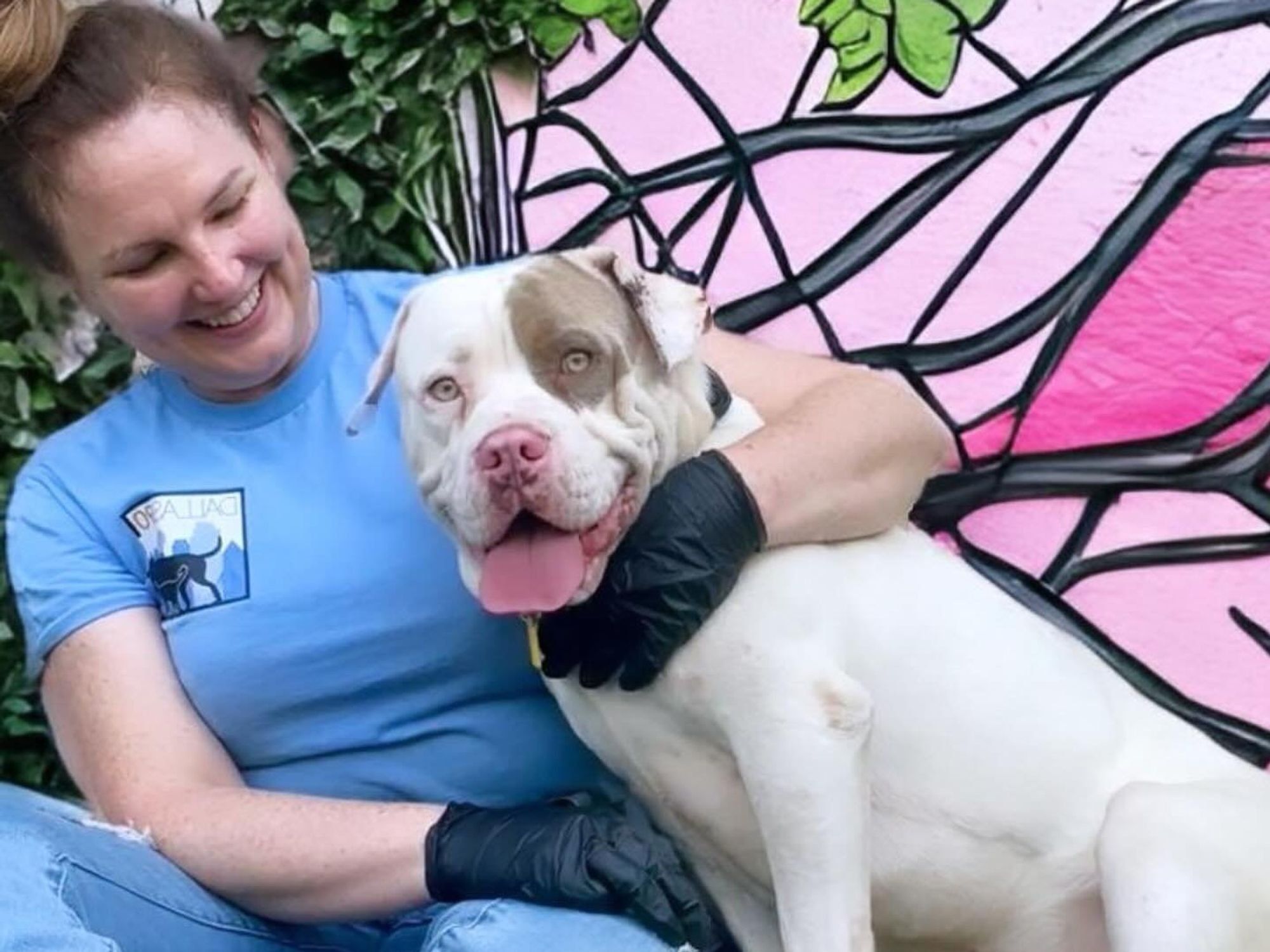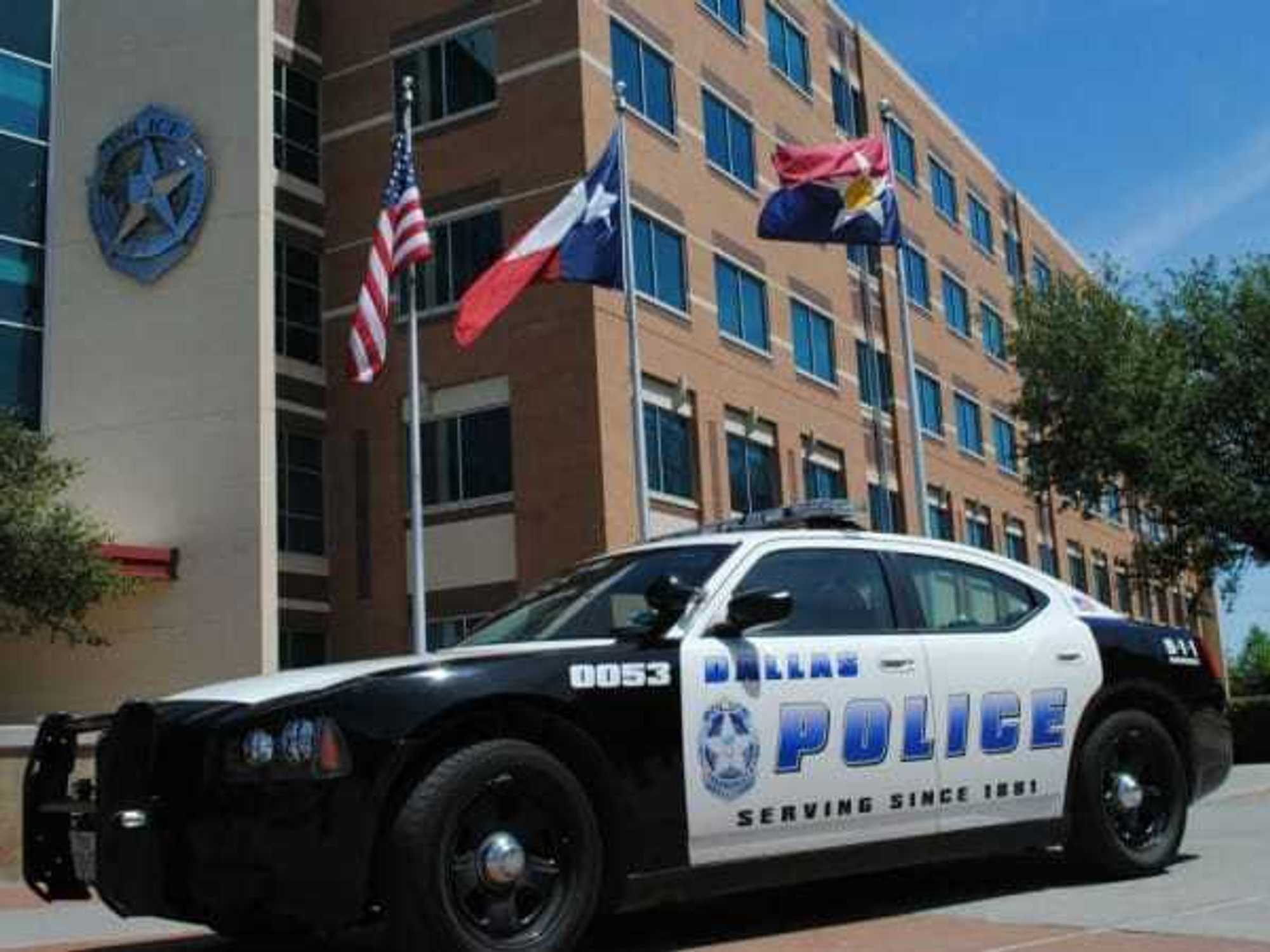Animal News
Dallas advocate breaks down the animal problem in Texas and one solution

Stephanie Casey at Dallas Animal Services with Charlie.
Even if you're not an animal person, it's hard to miss the fact that Dallas (and Texas) has a major animal problem.
Shelters in big cities and small — from Dallas Animal Services to Fort Worth Animal Care & Control to the Humane Society of Young County in Graham, Texas, to the Greenville Animal Shelter in east Texas to BARC Animal Shelter in Houston — are all overcrowded and overwhelmed, with daily pleas for citizens to foster or adopt.
And still, hundreds of unwanted animals are euthanized every day.
One animal advocate in the trenches has seen it first-hand: Stephanie M. Casey is a volunteer, foster, and member of the Dallas Animal Advisory Commission, who founded a platform called Dallas Love Bugs to share shelter animals looking for homes. She's conducted an analysis of the situation with suggestions on how to get out.
She's allowed us to reprint it here::
We Are In A Dog Overpopulation Crisis
We are in a dog overpopulation crisis… in the Southern USA, nationally, globally. We cannot adopt, rescue, or foster our way out of it. Yet those three spaces — adopt, rescue, foster — are where almost all resources (billions of dollars, many humans, and so much time) are concentrated in response to the dog overpopulation crisis.
The U.S. euthanizes approximately 1 million dogs and cats, every year. The reason: Dog overpopulation. Which is caused by dogs breeding i.e. reproduction. And the issue of dog reproduction is not being addressed in a focused, comprehensive manner.
Reproduction is the core issue behind dog overpopulation and the resulting euthanasia, and there is not significant effort in this sector with a comprehensive, longterm strategy. We are pouring billions of dollars a year at the end of the line — but there is no hope of ever quelling or ending the overpopulation crisis without adding or shifting effort and resources to the head of the problem.
There are bits of work here and there to shut down puppy mills; groups who work to enact breeding laws (which are frequently unenforced); scattered spay & neuter efforts; and numerous rescues rehoming dogs, all at the end of the line, one-by-one.
Dog Overpopulation
Dog overpopulation is: more dogs than there are homes interested in caring for those dogs, for the dog's entire life.
How do we curb the population of unwanted dogs? There is only one answer: Reduce breeding — whether that's breeding to sell dogs or because owners do not spay and neuter their pets.
To curb reproduction of dogs, we need to do the following:
- Make spay and neuter easy, plentiful, and free
- Make reproduction hard, by charging dearly for breeding licenses, requiring annual paperwork, and making welfare checks
- Support law enforcement of spay & neuter and breeding laws
- Educate the community about the issue
- Change public perception so that breeding is viewed as "irresponsible"
Why isn't an established, well-funded entity working on the core problem of dog reproduction?
There are some organizations offering spay and neuter services. And many shelters including Dallas Animal Services will spay and neuter pets before allowing them to be adopted.
But sometimes curing a symptom — in this case, helping dogs at risk one-by-one — is easier than proactively solving a problem. Individual animals suffering deplorable conditions seem to generate attention and donations. This may partly explain why large organizations are focused at the end of the line — helping dogs one-by-one.
Of course, those animals DO need our help. But it doesn't solve the problem.
Current distribution of resources in animal advocacy and welfare
An analysis of well-funded animal welfare organizations in the country and region shows nearly a billion dollars (outlined below) almost exclusively focused at the end of the line. In other words, the resources to help homeless animals are almost entirely stacked at the end of the spectrum.
To get to the core problem of breeding, we need:
- A dedicated division created at one of the large, super-funded organizations
- New and specifically-focused organization(s)
- Government department/task force
A multi-front campaign should run until data and scenarios have permanently shifted and we no longer have to euthanize healthy, adoptable dogs because there will be a manageable amount of dogs needing rehoming (versus the current volume of daily urgency and exhausting challenge).
To give an idea of the kinds of dollars being spent on the animal problem in North Texas and beyond, the list below provides an overview of some of the major organizations in the rescue and welfare space, with their total 2022 budgets — all toiling on the animal problem in DFW and Texas, but none able to focus on curbing dog overpopulation.
Among the Dallas organizations alone, nearly $50,000,000 is being spent on cleaning up the "animal problem" created by unchecked breeding. (And this doesn't include the dozens of individual rescues doing work on a smaller scale.)
Here's the list:
American Society for the Prevention of Cruelty to Animals (ASPCA): $340,000,000
The ASPCA is focused on cruelty to all animals. They are active in responding to natural disasters that put animals at risk and have a strong presence in education for veterinarians and other animal care professionals. The ASPCA acknowledges that unchecked stray growth is happening in areas without access to low cost spay and neuter readily available, but they have no plans or programs in place to correct this issue.
Best Friends Animal Society (BFAS): $221,000,000
The Best Friends Animal Society began as The Process Church of the Final Judgement, also known as The Process, which already had a non-profit status, and in 1991 the founders changed their focus and name to Best Friends Animal Society. Their current, key promotion is taking the USA to “No Kill” by 2025. BFAS is also involved in advocacy and legislative work such as puppy mills, outdoor cats, and breed-specific legislation. They operate three brick & mortar sanctuaries, including one in Utah.
Humane Society of the United States (HSUS): $174,000,000
Founded in 1954 with the mission to prevent cruelty to animals in laboratories, slaughter houses, and puppy mills. HSUS has a strong presence in the legislative arena for making laws that prevent abuse of all animals. HSUS also operates Black Beauty Ranch, a large sanctuary in Texas which is home to rescued domestic and exotic animals. One percent of their budget goes to support local shelters.
Society for the Prevention of Cruelty to Animals of Texas (SPCATX): $24,000,000
SPCA is based in Dallas, and operates two shelters/adoption centers, one spay/neuter clinic, and an emergency animal rescue center. They also maintain an Animal Cruelty Investigations unit with three full-time humane investigators.
Houston Society for the Prevention of Cruelty to Animals (HSPCA): $16,000,000
HSPCA operates a shelter/adoption center (which includes an equine center), wellness clinic, teaching hospital for Texas A&M veterinary students, and an emergency animal rescue facility.
Austin Pets Alive (APA): $17,000,000
APA operates a shelter and has worked as a support system to the Austin Municipal Shelter AAC (Austin Animal Control) pulling at least 12 percent of annual intakes which has supported AAC to meet the no-kill threshold (90 percent live release rate) since 2015. A new APA animal hospital is slated to open July 2024.
Dallas Pets Alive (DPA): $750,000
DPA is a rescue without a brick-and-mortar space, but works with DAS And takes dogs in via foster-based program. Their focus is on rescuing healthy and treatable pets at the greatest risk of euthanasia. DPA recently assumed Dogs Matter, another nonprofit which helps people seeking drug or alcohol rehabilitation treatment by finding fosters while the human is in treatment.
Operation Kindness (OPK): $8,000,000
OPK is a Dallas rescue, and one of the few to also operate a shelter. OPK is currently Dallas Animal Services' biggest support, taking the largest number of dogs and cats from DAS into their foster and adoption program.
Dallas Animal Services (DAS): $16,000,000
Dallas Animal Services is the municipal shelter for the city of Dallas, tasked with the care of stray and abandoned animals.
BARC Animal Shelter and Adoptions: $14,000,000
BARC is the municipal shelter for the city of Houston, tasked with the care of stray and abandoned animals.
P.S. Cats need us, too, but dogs present more of a public danger and need humans a bit more to survive. Finding solutions for the dog overpopulation problem will hopefully serve as a model to solve the cat overpopulation problem, as well.
